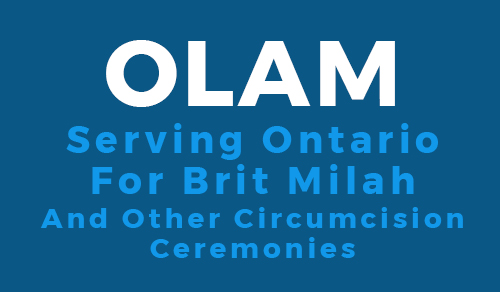You should call or email one of the Mohalim on the list as soon as you know that the baby is healthy. You may also want to speak to one of the Mohalim to discuss Brit Milah before the baby’s born. Our members welcome your questions and are happy to discuss any concerns you may have as the due date approaches.
The Bris should be performed on the eighth day of life. While medical circumcisions may be performed in hospital prior to this age, ritual circumcisions are never performed earlier than the eighth day. A Bris can and should be delayed, however, if the baby has a significant health issue such as severe jaundice, prematurity, low birth weight or infection. The Bris may also be delayed if there is concern with the anatomy of the penis or foreskin. Your doctor and your Mohel will determine when it is medically advisable to perform the circumcision.
The day of birth is considered the first day, so the eighth day is the same day of the week, one week later. If the baby is born after sundown, the Bris should be one day later, because the Jewish day starts at sundown.
A Bris must be performed before sunset. The Bris can be done later in the day during the summer months but not during the winter. Joyous occasions, such as a Bris, have traditionally been held earlier in the day, but the Mohel or important family members may not be available. The Mohel will try to accommodate individual circumstances.
The importance of the Brit Milah means this mitzvah must be performed even on Shabbat or a religious holiday, if that is the eighth day of the baby’s life. It should only be delayed if there is a health issue, as outlined above. Some rabbis recommend delaying the Bris until Sunday if the baby has been born by planned cesarean section. Please consult with your Rabbi and Mohel as soon as possible after delivery.
According to traditional Jewish law, if the mother is Jewish, the baby is Jewish and therefore, a Brit Milah should be performed. If the father is Jewish and the mother is not, the ceremony called Milah L’Shem Gerut, which was described earlier, is performed.
Metzitza is part of a traditional Bris ceremony in which the Mohel applies suction to the circumcision area through a plastic/glass syringe to draw a drop of blood but avoids direct contact with the baby. Most of the members of OLAM do not include this as part of the ceremony.
After you have spoken with the Mohel and arrived at a mutually convenient time, he/she will give you a list of the items you will need for the day of the Bris. He/she will also obtain the following information from you: your address and contact information, your child’s English and Hebrew name(s) and any family background you feel is important to avoid any awkwardness, e.g. divorced grandparents, blended family members.
You will be asked to choose a person to hold the baby during the circumcision (called the “Sandek”) and a person or people to hold him at the beginning of the ceremony (called the “Kvatter” and/or “Kvatterim”). Your Mohel is prepared to answer a wide range of questions you may have about this important family event.
All members of OLAM use local anesthesia for every Bris. In most cases, this will consist of an injection of freezing to block the nerves that go to the foreskin. The injection is done using a very small needle, which only hurts for a moment. Instead of or in addition to the injection, a topical local anesthetic agent such as EMLA or LMX cream may also be used. You should discuss the various methods of local anesthesia with your Mohel when you begin planning the Bris. It is also important to understand that babies often still cry during the circumcision, even if they are not feeling pain, because they are restrained, exposed or cold. Parents can feed the baby prior to the ceremony, and should plan to feed the baby immediately after the Brit Milah is completed.
The fee is established when the parents and the Mohel begin planning the Bris. Personal circumstances will be considered if finances are limited. We believe our fees should not be a barrier to performing this important Mitzvah.
Firstly, a double mazel tov! For twin boys, we generally perform a ceremony for each child, one after the other. If one of the twins is a girl, the Mohel can perform Brit Milah for the boy and a naming ceremony for the girl.
We always welcome your Rabbi to participate in the ceremony. Please ask your Rabbi to contact your Mohel to discuss how they can become involved in the planning for the Brit Milah.
